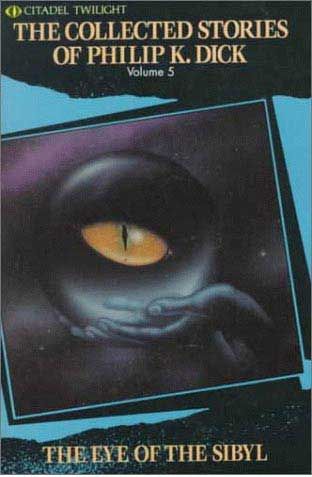"The Eye of the Sibyl and Other Classic Strories" - читать интересную книгу автора (Dick Philip Kindred)
 |
The Eye of the Sibyl and Other Classic Stories by Philip K. Dick
Introduction by Thomas M. Disch
The conventional wisdom has it that there are writers’ writers and readers’ writers. The latter are those happy few whose books, by some pheromonic chemistry the former can never quite duplicate in their own laboratories, appear year after year on the best seller lists. They may or (more usually) may not satisfy the up-market tastes of “literary” critics but their books sell. Writers’ writers get great reviews, especially from their admiring colleagues, but their books don’t attract readers, who can recognize, even at the distance of a review, the signs of a book by a writers’ writer. The prose style comes in for high praise (a true readers’ writer, by contrast, would not want to be accused of anything so elitist as “style”); the characters have “depth”; above all, such a book is “serious.”
Many writers’ writers aspire to the wider fame and higher advances of readers’ writers, and occasionally a readers’ writer will covet such laurels as royalties cannot buy. Henry James, the writers’ writer
Philip K. Dick was, in his time, both a writers’ writer and a readers’ writer; and neither; and another kind altogether—a science fiction writers’ science fiction writer. The proof of the last contention is to be found blazoned on the covers of a multitude of his paperback books, where his colleagues have vied to lavish superlatives on him. John Brunner called him “the most consistently brilliant science fiction writer in the world.” Norman Spinrad trumps this with “the greatest American novelist of the second half of the twentieth century.” Ursula LeGuin anoints him as America’s Borges, which Harlan Ellison tops by hailing him as SF’s “Pirandello, its Beckett and its Pinter.” Brian Aldiss, Michael Bishop, myself—and many others—have all written encomia as extravagant, but all these praises had very little effect on the sales of the books they garlanded during the years those books were being written. Dick managed to survive as a full-time free-lance writer only by virtue of his immense productivity. Witness, the sheer expanse of these
It is significant, I think, that all the praise heaped on Dick was exclusively from other SF writers, not from the reputation makers of the Literary Establishment, for he was not like writers’ writers outside genre fiction. It’s not for his exquisite style he’s applauded, or his depth of characterization. Dick’s prose seldom soars, and often is lame as any Quasimodo. The characters in even some of his most memorable tales have all the “depth” of a 50s sitcom. (A more kindly way to think of it: he writes for the traditional complement of America’s indigenous
Why, then, such paeans? For any aficionado of SF the answer is self-evident: he had great ideas. Fans of genre writing have usually been able to tolerate sloppiness of execution for the sake of genuine novelty, since the bane of genre fiction has been the constant recycling of old plots and premises. And Dick’s great ideas occupied a unique wave-band on the imaginative spectrum. Not for him the conquest of space. In Dick the colonization of the solar system simply results in new and more dismal suburbs being built. Not for him the Halloween mummeries of inventing new breeds of Alien Monsters. Dick was always too conscious of the human face behind the Halloween mask to bother with elaborate masquerades. Dick’s great ideas sprang up from the world around him, from the neighborhoods he lived in, the newspapers he read, the stores he shopped in, the ads on TV. His novels and stories taken all together comprise one of the most accurate and comprehensive pictures of American culture in the Populuxe and Viet Nam eras that exists in contemporary fiction—not because of his accuracy in the matter of inventorying the trivia of those times, but because he discovered metaphors that uncovered the
Well, the answer is obvious: polish, execution, economy of means, and other esthetic niceties. Most SF writers, however, have been able to get along without table linen and crystal so long as the protein of a meaty metaphor was there on the plate. Indeed, Dick’s esthetic failings could become virtues for his fellow SF writers, since it is so often possible for us to take the ball he fumbled and continue for a touchdown. Ursula LeGuin’s
Phil’s own note at the back of this book to his story
How does one fashion a book of resistance, a book of truth in an empire of falsehood, or a book of rectitude in an empire of vicious lies? How does one do this right in front of the enemy?
Not through the old-fashioned ways of writing while you’re in the bathroom, but how does one do that in a truly future technological state? Is it possible for freedom and independence to arise in new ways under new conditions? That is, will new tyrannies abolish these protests? Or will there be new responses by the spirit that we can’t anticipate?
(support [a t] reallib.org)